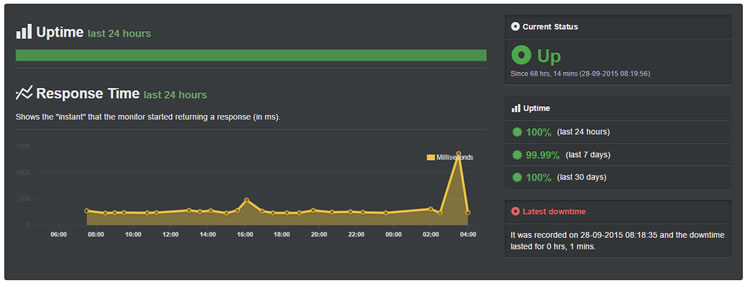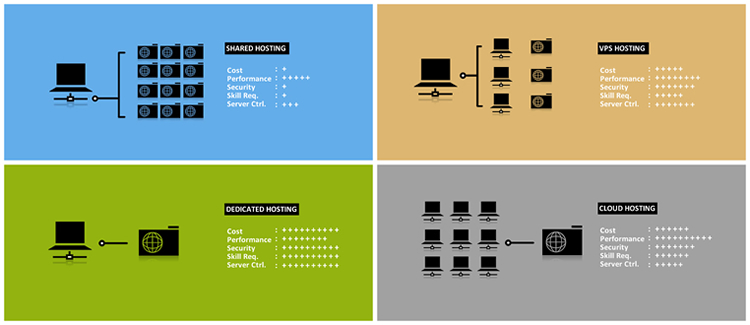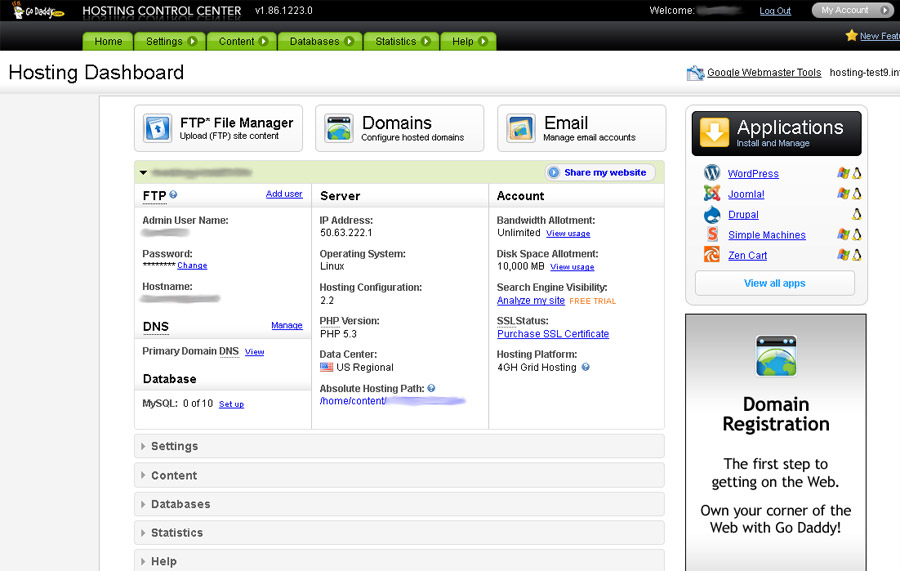What is Web Hosting?
Let us consider the files and folders on your PC stored on hard disk of your desktop or laptop and is ready to access whenever you need. Similarly, a web page is a file alike to your word documents that require your PC to store them; all web pages need a computer to store them.
The only difference is that web pages are expected to be seen by the public. In order to enable this, the computer on which they should be put away has to be much higher specification than your desktop computer, and it has to be connected to the Internet through a powerful link.
A computer on which the web pages are stored is known as a web server (since it serves pages, on request, to clients on the Internet). On the whole a collection of web pages is a website, and on the whole all the web pages all over the world form the World Wide Web (WWW).
The process of making websites and web pages accessible to numerous users is called web hosting. The web hosting companies offers web “space” on the Internet for you to host your site. Generally, Web space is measured in megabytes, alike how you measure the space on your computer.
Why do we need Web Hosting?
It is technically possible to connect your own PC or Mac to the Internet and have it serve pages. In any case, it is not functional since as a rule a home-based Internet connection is not sufficiently enough to serve numerous clients in the meantime.
Thus, web hosting organizations exist. They claim and keep up effective web servers which store your website pages. They unite these web servers to the Internet by powerful connections, allowing numerous web clients to get to your site pages in the meantime.

If need to run a web site you require web hosting since, unless you have boundless resources or funds you would not have the capacity to bear the cost of the web servers and connections.
So, now how do you choose the best web hosting service providers that suits your needs? How do you decide which web host is good? You can get answers to these questions by following the below 10 – point checklist that help you pick the right web hosting service that match all your needs,
Here we go,
- Get to know your hosting needs
You will never find a right web hosting service until you get know what you really need. So before you go any further – set everything aside and think clearly about all alone needs.
- What kind of site would you say you are building?
- Do you need something normal (a WordPress blog, for instance)?
- Do you require Windows applications?
- Do you require a version of software?(ie. PHP)?
- Does your site need special software?
- How huge (or small) foes the web traffic volumes go?
These are the portion of the essential inquiries you have to respond in due order regarding yourself.
Have a quick picture of what you need to do with your site now. Figure what happens next for the following 12 months.
For beginners, the easy decision standard is to better begin slowly with a good shared hosting account.
What is a shared hosting?
A shared hosting is an affordable, simple to keep up, and adequate for most new sites. In addition, you can simply move up to VPS or hosting in the later stage when your site becomes bigger.

Most of the websites on the web are hosted on a shared hosting plan. It can cost as low as $1 every month to as high as $25 every month relying on the hosting company and their resources. Suppose you have another site or a current blog or site that is not getting much of traffic share hosting is what you need.
It’s useful for a personal site or a small/ startup business site (accepting that they don’t get a huge amount of traffic each and every day and everything they need is an online presence in addition to business email). Also, shared web hosting is everything you need to have various sites too — unless they are not getting much visits a day.
- Server Reliability / Up-time Scores
Nothing is more vital than having a 24×7 working web host. You require a web host is working on an effective server and stable system connections. 99.5% or more is the prescribed up-time score; anything less than 99% is not acceptable.
There are various other ways to acquire a web host up-time data. One approach to do as such is by going through my hosting surveys and reviews – where we distribute up-time records in view of our test websites every once in a while.
On the other hand, you can essentially track your web host with server screen tools– a large portion of these tools are free on trial.
Do check the samples below,

- Server upgrades options
Shared web hosts are really powerful and effective nowadays.

On an average, a shared hosting account must be sufficient to support a WordPress blog with about 30,000 – 40,000 unique visitors monthly. However, if you are expecting your blog or website to grow in about 2 – 3 years, then you better choose web host with room to upgrade – from shared hosting to virtual dedicated server – for more memory limit, memory capacity, storage capacity and better security features.
- Reliable and speed of access
This is very important. A site that is every now and again down will lose a lot of visitors. If someone finds your site from the search engines, and when anyone tries to get to it yet find that it is down, he/she will essentially go to another webpage. Moderate access is likewise exceptionally baffling for guests (and for you as well, when you transfer your site). How would you know whether a host is reliable or quick? If you can’t get input from anyone else, one route is to give it a shot yourself over a time-frame, both amid crest and also off-top hours. It is free, so you can simply try experiment with it.
- Hosting Costs
Hosting Costs, especially shared hosting, are regularly offering exceptionally affordable on sign up costs however charge much higher on renewals.
It is an industry standard. Unless you are willing to circle between a one or two web hosts for every two years, there is no real way to stay away from the expensive renewal costs.
Well, any kind of shared web hosting pricing below $10/mo is satisfactory yet you may have a lower resistance. You can even check the TOS and ensure you are fine with the renewal costs before the sign up process.
- Bandwidth allotment
These days, numerous free web hosting services impose a particular limitation on the amount of traffic to be used by a website as per day or per month. If the pages (and graphic pictures) on your webpage is loaded by guests past a specific number of times each day (or every month), the web host will disable your site (or maybe send you a bill). It is hard to suggest a particular bandwidth amount, since it relies on upon how you design your site, your intended targeted audience, and the number of visitors you’re ready to pull in to your site. Generally, 100MB of traffic for every month is too less to anything other than your own landing page and 1-3GB traffic for each month is generally sufficient for a simple site just beginning out.
- Refund Policy
Suppose you want to cancel your host within the trial period, does the hosting provider refund you?
These are some common things to ask before signing up.
Get to know,
- What would be the companies refund policy after the completion of the trial period?
- Is there any cancellation charges?
It’s very important to know your hosting provider handle client refunds so that you don’t need to lose much amount of money when things turn out badly.
- e-Commerce Features
Are you running an eCommerce site? Using any shopping cart software? Require technical support? If yes, then it is essential for you to pick a web host with adequate e-commerce features support. SSL certification, dedicated IP, and a single tick shopping cart software installation are important features.
- User friendly hosting control panel
A user friendly control panel is, important. It doesn’t make a difference if it’s a c Panel or a Plesk or an outsider control panels (like what we have at GoDaddy) – we are fine until and unless it is easy to understand and accompany all the vital functions.

- Site Backup
There are times when a site crashes. Maybe a hacker got into your WordPress blog and supplanted your index.php document, or your whole database got nuked, or the server had a serious hard disk failure. If your web host sites backups frequently then there is nothing to stress over when these occurrences happen. Your hosting provider needs to have the functionalities to restore back your full site in no time.

